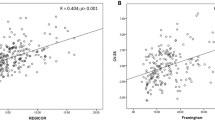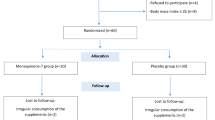Abstract
Background/Objectives:
A relationship between osteocalcin (OC) levels and factors associated with energy metabolism and insulin resistance has been reported recently. The aim of this study was to investigate whether modulation of ostecalcin isoforms via vitamin K1 supplementation would affect glucose metabolism or insulin sensitivity in prediabetic and premenopause women.
Subjects/Methods:
Eighty-two prediabetic women were randomized to consume vitamin K1 supplement (n=39) or placebo (n=43) for 4 weeks. Participants in the vitamin K1 supplement group received one pearl softgel capsule containing 1000 μm of phylloquinone, and the placebo group received one placebo capsule daily for 4 weeks. Blood samples were collected at baseline and after the 4-week intervention period to quantify carboxylated OC (cOC), undercarboxylated OC (ucOC) and relevant variables.
Results:
Phylloquinone supplementation increased the serum levels of cOC and decreased ucOC, compared with placebo (12.53±5.95 compared with 7.43±4.85 ng/ml and 2.47±1.91 compared with 4.79±2.43 ng/ml, respectively; P<0.001). Furthermore, intake of phylloquinone supplement led to significant decreases in %ucOC (17.97±12.24 compared with 43.80±19.86) and 2-h post-oral glucose tolerance test (OGTT) glucose (7.32±1.50 compared with 8.62±1.45 mmol/l), and 2- h post-OGTT insulin level (80.34±42.24 compared with 112.43±53.19 μIU/ml) and increased insulin sensitivity index (2.46±0.71 compared with 1.75±0.61) compared with placebo. Overall, a significant association was found between changes in %ucOC and changes in 2-h post-OGTT glucose (r=0.308, P=0.028).
Conclusions:
The results of this study demonstrated that vitamin K1 supplementation for 4 weeks did not affect insulin resistance in premenopausal and prediabetic women but had beneficial effects on glycemic status and insulin sensitivity.
This is a preview of subscription content, access via your institution
Access options
Subscribe to this journal
Receive 12 print issues and online access
$259.00 per year
only $21.58 per issue
Buy this article
- Purchase on Springer Link
- Instant access to full article PDF
Prices may be subject to local taxes which are calculated during checkout
Similar content being viewed by others
References
Lee NK, Sowa H, Hinoi E, Ferron M, Ahn JD, Confavreux C et al. Endocrine regulation of energy metabolism by the skeleton. Cell 2007; 130: 456–469.
Booth SL, Lichtenstein AH, O'Brien-Morse M, McKeown NM, Wood RJ, Saltzman E et al. Effects of a hydrogenated form of vitamin K on bone formation and resorption. Am J Clin Nutr 2001; 74: 783–790.
Beulens JW, van der AD, Grobbee DE, Sluijs I, Spijkerman AM, van der Schouw YT . Dietary phylloquinone and menaquinones intakes and risk of type 2 diabetes. Diabetes Care 2010; 33: 1699–1705.
Pan Y, Jackson RT . Dietary phylloquinone intakes and metabolic syndrome in US young adults. J Am Coll Nutr 2009; 28: 369–379.
Yoshida M, Booth SL, Meigs JB, Saltzman E, Jacques PF . Phylloquinone intake, insulin sensitivity, and glycemic status in men and women. Am J Clin Nutr 2008; 88: 210–215.
Kanazawa I, Yamaguchi T, Tada Y, Yamauchi M, Yano S, Sugimoto T . Serum osteocalcin level is positively associated with insulin sensitivity and secretion in patients with type 2 diabetes. Bone 2011; 48: 720–725.
Hwang YC, Jeong IK, Ahn KJ, Chung HY . The uncarboxylated form of osteocalcin is associated with improved glucose tolerance and enhanced beta-cell function in middle-aged male subjects. Diabetes Metab Res Rev 2009; 25: 768–772.
Kumar R, Binkley N, Vella A . Effect of phylloquinone supplementation on glucose homeostasis in humans. Am J Clin Nutr 2010; 92: 1528–1532.
Yoshida M, Jacques PF, Meigs JB, Saltzman E, Shea MK, Gundberg C et al. Effect of vitamin K supplementation on insulin resistance in older men and women. Diabetes Care 2008; 31: 2092–2096.
Abseyi N, Siklar Z, Berberoglu M, Hacihamdioglu B, Savas Erdeve S, Ocal G . Relationships between osteocalcin, glucose metabolism, and adiponectin in obese children: Is there crosstalk between bone tissue and glucose metabolism? J Clin Res Pediatr Endocrinol 2012; 4: 182–188.
Lu C, Ivaska KK, Alen M, Wang Q, Tormakangas T, Xu L et al. Serum osteocalcin is not associated with glucose but is inversely associated with leptin across generations of nondiabetic women. J Clin Endocrinol Metab 2012; 97: 4106–4114.
American Diabetes Association. Diagnosis and classification of diabetes mellitus. Diabetes Care 2011; 34: 62S–69SS.
Matthews DR, Hosker JP, Rudenski AS, Naylor BA, Treacher DF, Turner RC . Homeostasis model assessment: insulin resistance and beta-cell function from fasting plasma glucose and insulin concentrations in man. Diabetologia 1985; 28: 412–419.
Gutt M, Davis CL, Spitzer SB, Llabre MM, Kumar M, Czarnecki EM et al. Validation of the insulin sensitivity index (ISI(0,120)): comparison with other measures. Diabetes Res Clin Pract 2000; 47: 177–184.
DeFronzo RA, Matsuda M . Reduced time points to calculate the composite index. Diabetes Care 2010; 33: e93.
Ferron M, Hinoi E, Karsenty G, Ducy P . Osteocalcin differentially regulates beta cell and adipocyte gene expression and affects the development of metabolic diseases in wild-type mice. Proc Natl Acad Sci USA 2008; 105: 5266–5270.
Kanazawa I, Yamaguchi T, Yamauchi M, Yamamoto M, Kurioka S, Yano S et al. Serum undercarboxylated osteocalcin was inversely associated with plasma glucose level and fat mass in type 2 diabetes mellitus. Osteoporos Int 2011; 22: 187–194.
Prats-Puig A, Mas-Parareda M, Riera-Perez E, Gonzalez-Forcadell D, Mier C, Mallol-Guisset M et al. Carboxylation of osteocalcin affects its association with metabolic parameters in healthy children. Diabetes Care 2010; 33: 661–663.
Chen X, Wu Y, Liu L, Tian H, Yu X . Osteocalcin is inversely associated with glucose levels in middle-aged Tibetan men with different degrees of glucose tolerance. Diabetes Metab Res Rev 2013; 30: 476–482.
Iki M, Tamaki J, Fujita Y, Kouda K, Yura A, Kadowaki E et al. Serum undercarboxylated osteocalcin levels are inversely associated with glycemic status and insulin resistance in an elderly Japanese male population: Fujiwara-kyo Osteoporosis Risk in Men (FORMEN) Study. Osteoporos Int 2012; 23: 761–770.
Fernandez-Real JM, Izquierdo M, Ortega F, Gorostiaga E, Gomez-Ambrosi J, Moreno-Navarrete JM et al. The relationship of serum osteocalcin concentration to insulin secretion, sensitivity, and disposal with hypocaloric diet and resistance training. J Clin Endocrinol Metab 2009; 94: 237–245.
Kanazawa I, Yamaguchi T, Yamamoto M, Yamauchi M, Kurioka S, Yano S et al. Serum osteocalcin level is associated with glucose metabolism and atherosclerosis parameters in type 2 diabetes mellitus. J Clin Endocrinol Metab 2009; 94: 45–49.
Kindblom JM, Ohlsson C, Ljunggren O, Karlsson MK, Tivesten A, Smith U et al. Plasma osteocalcin is inversely related to fat mass and plasma glucose in elderly Swedish men. J Bone Miner Res 2009; 24: 785–791.
Pittas AG, Harris SS, Eliades M, Stark P, Dawson-Hughes B . Association between serum osteocalcin and markers of metabolic phenotype. J Clin Endocrinol Metab 2009; 94: 827–832.
Pollock NK, Bernard PJ, Gower BA, Gundberg CM, Wenger K, Misra S et al. Lower uncarboxylated osteocalcin concentrations in children with prediabetes is associated with beta-cell function. J Clin Endocrinol Metab 2011; 96: E1092–E1099.
Sokoll LJ, Booth SL, O'Brien ME, Davidson KW, Tsaioun KI, Sadowski JA . Changes in serum osteocalcin, plasma phylloquinone, and urinary gamma-carboxyglutamic acid in response to altered intakes of dietary phylloquinone in human subjects. Am J Clin Nutr 1997; 65: 779–784.
Rutter MK, Meigs JB, Sullivan LM, D'Agostino RB Sr., Wilson PW . Insulin resistance, the metabolic syndrome, and incident cardiovascular events in the Framingham Offspring Study. Diabetes 2005; 54: 3252–3257.
Choi HJ, Yu J, Choi H, An JH, Kim SW, Park KS et al. Vitamin K2 supplementation improves insulin sensitivity via osteocalcin metabolism: a placebo-controlled trial. Diabetes Care 2011; 34: e147.
Schwartz AV, Schafer AL, Grey A, Vittinghoff E, Palermo L, Lui LY et al. Effects of antiresorptive therapies on glucose metabolism: results from the FIT, HORIZON-PFT, and FREEDOM trials. J Bone Miner Res 2013; 28: 1348–1354.
Acknowledgements
This paper is issued from the PhD thesis of Hamid Rasekhi, and the financial support was provided by Nutrition and Metabolic Diseases Research Center, Ahvaz Jundishapur University of Medical Sciences (grant number NRC-9108). This trial was registered in Iranian Registry of Clinical Trials with ID number of IRCT2013120915724N1.
Author information
Authors and Affiliations
Corresponding author
Ethics declarations
Competing interests
The authors declare no conflict of interest.
Rights and permissions
About this article
Cite this article
Rasekhi, H., Karandish, M., Jalali, M. et al. The effect of vitamin K1 supplementation on sensitivity and insulin resistance via osteocalcin in prediabetic women: a double-blind randomized controlled clinical trial. Eur J Clin Nutr 69, 891–895 (2015). https://doi.org/10.1038/ejcn.2015.17
Received:
Revised:
Accepted:
Published:
Issue Date:
DOI: https://doi.org/10.1038/ejcn.2015.17
This article is cited by
-
The effect of vitamin K4 supplementation on insulin resistance in individuals with type 2 diabetes: a double-blind randomised placebo-controlled clinical trial
European Journal of Nutrition (2023)
-
Effect of vitamin K2 administration on depression status in patients with polycystic ovary syndrome: a randomized clinical trial
BMC Women's Health (2022)
-
The effect of menaquinone-7 supplementation on dp-ucMGP, PIVKAII, inflammatory markers, and body composition in type 2 diabetes patients: a randomized clinical trial
Nutrition & Diabetes (2022)
-
Treatment with direct oral anticoagulants or warfarin and the risk for incident diabetes among patients with atrial fibrillation: a population‐based cohort study
Cardiovascular Diabetology (2021)
-
Vitamin K2 (menaquinone-7) increases plasma adiponectin but does not affect insulin sensitivity in postmenopausal women: a randomized controlled trial
European Journal of Clinical Nutrition (2021)



